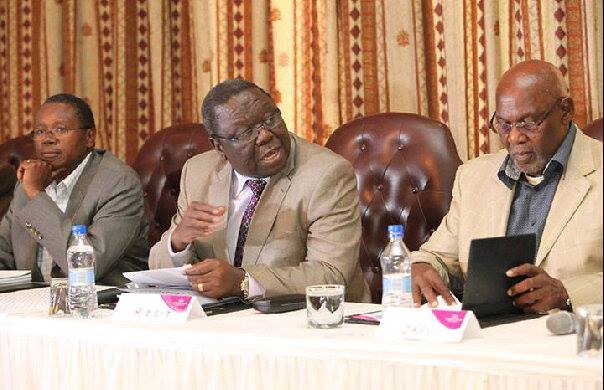Where is the opposition?
By Shepherd Mpofu
Although current events taking place in the ruling party, ZANU-PF, make for a nail-biting screening for the ordinary masses, it has begged the uncomfortable question of where Zimbabwe’s opposition parties are, as the revolutionary party proceeds down on a slippery slope of self-annihilation.

The drama that has unfolded so far has taught people many things.
For starters, ZANU-PF has always led us down the garden path to make us believe that it was a united party, and that problems were being caused by external imperialist forces. That facade has worn off day-by-day as it has become increasingly clear that the biggest threat to ZANU-PF is itself.
In December 2014, former vice president Joice Mujuru became the clearest sign of the wheels coming off ZANU-PF as she and nearly 200 other party officials were either expelled or suspended from the party.
The struggles which have gripped ZANU-PF ever since “Mujurugate” have shown that just like the frail opposition currently occupying Zimbabwe’s political discourse, the revolutionary party, which boasts of over 50 years of existence is not impervious to power struggles. Factionalism indeed has become the buzzword, taking place right under the nose of ZANU-PF’s “one centre of power” mantra.
While all the ructions are ongoing in the ruling party, there appears to be no fleeting sign of the opposition rising to the occasion to exploit the unfolding implosion in ZANU-PF. The country is in desperate need of an opposition that will mobilise and gain the trust of voters well in time before the next elections.
That so far, unfortunately has been the missing piece in the political jigsaw puzzle that has gripped Zimbabwe’s political landscape. There are many questions and yet no answers to why the opposition has become impotent.
Is the opposition still beholden to ZANU-PF? Perhaps this is an after effect of the five-year unity government that saw President Robert Mugabe and Morgan Tsvangirai being forced to work together. Is the opposition pre-occupied with analysing the trajectories of different factions emerging from ZANU-PF such that it has to an extent forgotten that it has to keep working hard in order to remain relevant?
The signs coming from ZANU-PF may all be too bamboozling to say the least for the opposition. President Mugabe who turned 92 years old last month appears to be going nowhere. One faction in ZANU-PF dubbed Generation 40 is all too happy with that conclusion of the matter, while another angling to see a change of guard at the party’s top helm, appears vanquished, if recent events are anything to go by.
What is important at this juncture is that opposition parties, including Mujuru’s recently launched ZPF, must come up with a unifying strategy that will not only bring together opposition parties, but that will give Zimbabweans a new dignifying hope of the possibility of a new future outside ZANU-PF.
It cannot be denied that the opposition parties have been visiting some constituencies or having small meetings across the country. But why have these not stolen the limelight? First Lady, Grace Mugabe has been attracting a lot more people to her rallies. This is truly bizarre.
The argument could be that State-controlled public media does not cover the opposition party campaigns. This is expected and can happen only in Zimbabwe.
The private-owned media has also been seized with the goings on in ZANU-PF, but the opposition does not need the media for it to strategise and position itself as a contender to power.
Another loosely held conviction among the opposition is to wait for ZANU-PF’s own internal destruction to be complete so that they can come up with alternatives. This could work in a situation where you want to contest for elections in 10 years time.
The opposition parties should form a united front and take the Zimbabwean political landscape by storm as soon as possible because, should they wait, they might struggle to even unite let alone gather momentum and trust in the already despondent population.
Shepherd Mpofu holds a PhD in Media Studies from Wits University in South Africa. He teaches and researches on issues of identity, journalism/media and new media and politics in Zimbabwe.






